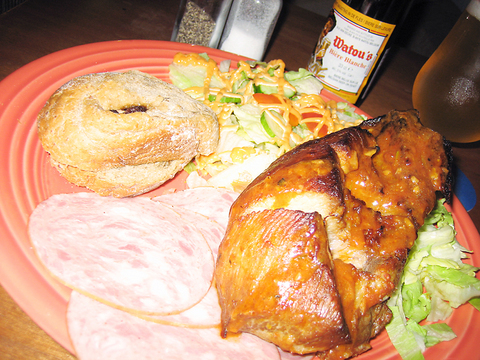Odeon means "house of song" in Greek and is thus a popular name for cultural venues and restaurants that want to give off a classy, artsy vibe. It's the name of a cinema chain in the UK, an events center in Saskatoon, Canada, a restaurant on New York's Broadway Avenue and a student district cafe in Taiwan.
Though the Cafe Odeon opus II (now known as CO2) on Xinsheng Road probably doesn't have much on the US$20 entrees at The Odeon on Broadway, it does a respectable job of creating a culture-friendly atmosphere. The theme for both the food and the decor is European, with an emphasis on Belgium. Picture albums on a bookshelf by the door chronicle owner Arvin Cheng's (
The cafe's location in an alley across from National Taiwan University works well to heighten the sense of artsy academia CO2 strives for. Written in chalk on a blackboard sign by the door is an explanation of how Cheng chose the name Odeon: "Odeon is the name of a stop on the Paris subway in an area where the arts and humanities flourish ... we hope that Odeon can provide a similar cultural space."

PHOTO: MEREDITH DODGE , TAIPEI TIMES
But CO2 is better known for providing a wide selection of Belgian beer, and that is not a bad thing. From the light to the dark to the positively fruity, CO2's beer fridge has what you're looking for. After walking around in the hot sun I decided to order a Watou's witbier (Flemish for "white beer") -- refreshing with a hint of jasmine.
The meal I ordered to go with it, a stack of pork ribs with beer wurst, wasn't exactly refreshing, but it certainly was replenishing. The salad was an unnecessarily large pile of lettuce and a few tomatoes criss-crossed with thousand-island dressing -- I only ate about a quarter of it. That's because I was thoroughly engaged with the hunk of meat sitting next to it.
The rib meat was tender and juicy and accompanied with an appropriate layer of tasty fat. Though the steak knife they gave me cut the meat easily off the bone, I worked up a sweat eating the ribs. Luckily I had saved some witbier to quench my thirst. I say luckily because the lame salad and the bone-dry raisin toast (they could have at least given me some butter) did nothing to counteract the ultra-heavy meatiness of the ribs. Overally, however, CO2 is a great place for a beer and a chat
with friends. Food is served till late.

In the March 9 edition of the Taipei Times a piece by Ninon Godefroy ran with the headine “The quiet, gentle rhythm of Taiwan.” It started with the line “Taiwan is a small, humble place. There is no Eiffel Tower, no pyramids — no singular attraction that draws the world’s attention.” I laughed out loud at that. This was out of no disrespect for the author or the piece, which made some interesting analogies and good points about how both Din Tai Fung’s and Taiwan Semiconductor Manufacturing Co’s (TSMC, 台積電) meticulous attention to detail and quality are not quite up to

April 28 to May 4 During the Japanese colonial era, a city’s “first” high school typically served Japanese students, while Taiwanese attended the “second” high school. Only in Taichung was this reversed. That’s because when Taichung First High School opened its doors on May 1, 1915 to serve Taiwanese students who were previously barred from secondary education, it was the only high school in town. Former principal Hideo Azukisawa threatened to quit when the government in 1922 attempted to transfer the “first” designation to a new local high school for Japanese students, leading to this unusual situation. Prior to the Taichung First

Chinese Nationalist Party (KMT) Chairman Eric Chu (朱立倫) hatched a bold plan to charge forward and seize the initiative when he held a protest in front of the Taipei City Prosecutors’ Office. Though risky, because illegal, its success would help tackle at least six problems facing both himself and the KMT. What he did not see coming was Taipei Mayor Chiang Wan-an (將萬安) tripping him up out of the gate. In spite of Chu being the most consequential and successful KMT chairman since the early 2010s — arguably saving the party from financial ruin and restoring its electoral viability —

The Ministry of Education last month proposed a nationwide ban on mobile devices in schools, aiming to curb concerns over student phone addiction. Under the revised regulation, which will take effect in August, teachers and schools will be required to collect mobile devices — including phones, laptops and wearables devices — for safekeeping during school hours, unless they are being used for educational purposes. For Chang Fong-ching (張鳳琴), the ban will have a positive impact. “It’s a good move,” says the professor in the department of